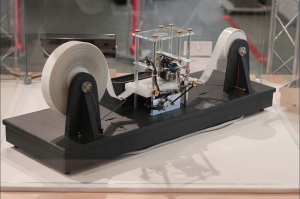Here is a fact which is still blowing my mind, albeit quietly, from the horizon.
Turing Machines, the formalism which we use to describe computation, do not, strictly speaking, cover computational processes which have access to random values. When we wish to reason about such machines people typically imagine a Turing Machine with two tapes, one which takes on the typical role and another which contains an infinite string of random numbers which the machine can peel off one at a time.
I know what you are all thinking: can’t I just write a random number generator and put it someplace on my turing machine’s tape, and use that? Sure, but those numbers aren’t really random, particularly in the sense that a dedicated attacker, having access to the output of your turing machine can in principle detect the difference between your machine and one with bona fide random numbers if it has access to your outputs. And, in fact, the question of whether there exists a random number generator which uses only polynomial time and space such that a polynomial time and space algorithm is unable to detect whether the numbers derive from a real random process or an algorithm is still open.
All that is really an aside. What is truly, profoundly surprising to me is this: a machine which has access to random numbers seems to be more powerful than one without random numbers. In what sense? There are algorithms which are not practical on a normal turing machine which become immanently practical on a turing machine with a random tape as long as we are able to accept a vanishingly small probability that the result is wrong. Algorithms about which we can even do delta/epsilon style reasoning: that is, we can make the probability of error as small as we like by the expedient of repeating the computation with new random numbers and (for instance) using the results as votes to determine the “correct answer.” This expedient does not really modify the big O complexity of algorithms.
Buridan’s Ass is a paradox in which a hungry donkey sits between two identical bales of hay and dies of hunger, unable to choose which to eat on account of their equal size. There is a strange sort of analogy here: if the Ass has a source of random numbers he can pick one randomly and survive. It is almost as if deterministic, finitist mathematics, in its crystalline precision, encounters and wastes energy on lots of tiny Ass’ Dilemmas which put certain sorts of results practically out of reach, but if we fuzz it up with random numbers, suddenly it is liberated to find much more truth than it was before. At least that is my paltry intuitive understanding.
